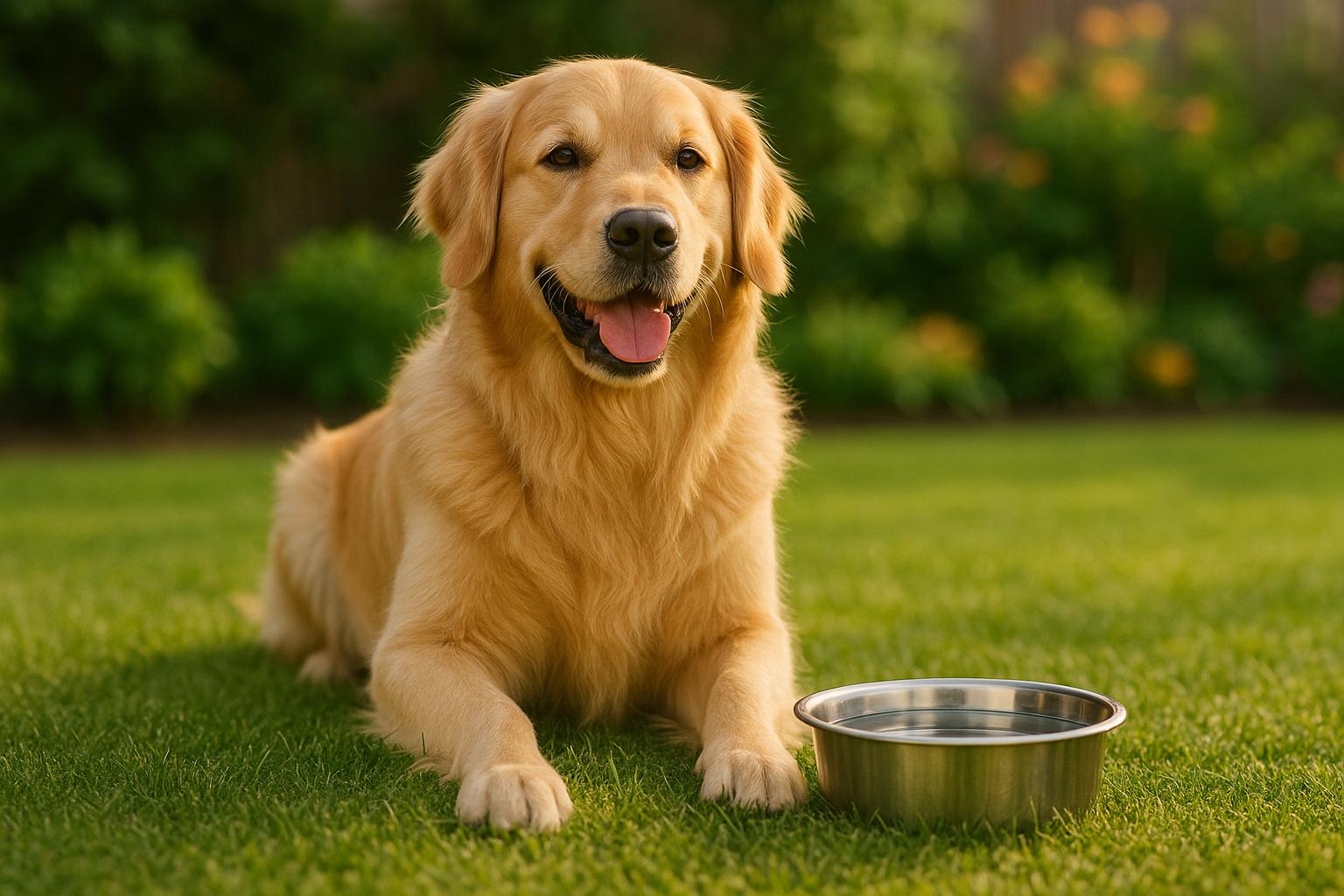
Dog Urinary Health Guide: Management & Care Tips
Did you know that 14% of dogs experience a urinary tract infection (UTI) in their lifetime, and up to 10% of senior dogs face kidney disease? These issues can cause discomfort and lead to serious health problems if untreated. Here's what you need to know to manage urinary problems in dogs:
Key Takeaways:
- Common Issues: UTIs, bladder stones, and urinary incontinence are frequent problems.
-
Support Tips:
- Keep your dog hydrated: 1 ounce of water per pound of body weight daily.
- Feed a balanced diet: Wet food helps with hydration and reduces stone risks.
- Maintain cleanliness: Regularly clean your dog's genital area and living space.
- Supplements: D-Mannose, cranberry extract, and probiotics can support urinary health.
- Warning Signs: Straining to urinate, blood in urine, or showing pain during urination needs immediate veterinary attention.
Quick Solutions:
- Provide fresh water daily and encourage drinking.
- Use pet-safe wipes for hygiene after urination.
- Consult your vet if you notice any unusual symptoms.
Taking these steps can help your dog stay healthy, comfortable, and happy. Read on for detailed advice on management, diet, and when to see your vet.
Vet Minute: Dog Urinary Tract Infection and Bladder Infection in Dogs
How Dogs' Urinary Systems Work
Understanding your dog's urinary system is crucial for keeping them healthy. This system plays a vital role in filtering waste, maintaining fluid balance, and supporting overall well-being.
Main Parts of the Urinary System
A dog's urinary system has four key components that work together to remove waste and regulate bodily functions:
The Kidneys
The kidneys are the powerhouse of the urinary system. They:
- Filter toxins from the bloodstream
- Regulate blood pressure
- Support red blood cell production
- Process vitamin D
- Maintain electrolyte and water balance
- Stabilize the body's fluid pH
The Ureters
These tubes carry urine from the kidneys to the bladder, ensuring a continuous flow.
The Bladder
This expandable organ serves as a temporary storage space for urine until it’s time to eliminate it.
The Urethra
The urethra is the final pathway, transporting urine from the bladder to the outside of the body.
Even minor issues in this system can lead to health problems, highlighting its importance.
"With USMI, the muscles that control the ability to hold urine become weak and dysfunctional." - Dr. Jo Myers, Veterinarian on Vetster
Top Urinary Problems in Dogs
Dogs can face several common urinary issues. Below are some of the most frequent problems, along with their causes:
| Problem | Description | Common Causes |
|---|---|---|
| Urinary Tract Infections (UTIs) | Bacterial infections in the urinary system | - Poor hygiene - Underlying health issues - Anatomical problems |
| Bladder Stones | Mineral deposits in the bladder | - Imbalanced diet - Low water intake - Abnormal urine pH - UTIs |
| Urinary Incontinence | Involuntary leakage of urine | - Weak bladder muscles - Hormonal changes - Spinal issues - Aging |
Urinary incontinence is particularly common, affecting over 20% of spayed females and up to 30% of large-breed dogs.
Several factors can contribute to urinary issues, including:
- Chronic conditions like diabetes or Cushing's disease
- Certain medications, especially corticosteroids
- Anatomical irregularities
- Prostate problems in male dogs
- Dehydration or insufficient water intake
Interestingly, dogs can live normal, healthy lives with just one kidney.
How to Manage Urinary Problems
Understanding your dog's urinary system is just the first step. The key to keeping it healthy lies in consistent care and smart support strategies that support its function and reduce potential health risks.
Water and Drinking Habits
Proper hydration is crucial for urinary health. A good rule of thumb is that your dog needs 1 ounce of water per pound of body weight daily. For example, a 50-pound dog should drink about 50 ounces of water each day.
Here are some tips to encourage your dog to stay hydrated:
Multiple Water Stations
Place water bowls in various spots around your home and outdoor areas. Opt for large bowls that can hold at least a quart of water.
Water Quality and Presentation
- Change the water often to keep it fresh.
- Consider using a pet water fountain to make drinking more appealing.
- Use stainless steel or ceramic bowls, as these materials help prevent bacterial growth.
If your dog is a picky drinker, try adding a teaspoon of low-sodium meat broth to each cup of water. This can make the water more enticing while still keeping it healthy.
While hydration is vital, your dog's diet also plays a significant role in maintaining urinary health.
Best Foods for Urinary Health
A well-balanced diet helps regulate urine pH and reduces the risk of stone formation. Wet food, for instance, has a much higher moisture content (70–90%) compared to dry food, which contains only about 10% moisture.
| Food Type | Benefits | Usage Tip |
|---|---|---|
| Wet Food | High moisture (70–90%) | Use as the main diet option |
| Dry Food | Easy to store | Add 1 cup of water to 1 cup of kibble |
| Fresh Food | Natural moisture | Consider raw or gently cooked meals |
In addition to diet and hydration, cleanliness is another critical factor in preventing urinary problems.
Keeping Your Dog Clean
Good hygiene can go a long way in reducing the risk of infections. This includes keeping your dog's genital area clean, trimming fur, and maintaining a clean environment.
Essential Hygiene Practices
- Use pet-safe wipes to clean the genital area after urination, especially for dogs with skin folds.
- Trim the fur around the genital area to minimize bacterial buildup.
- Wash bedding and toys frequently to keep bacteria at bay.
sbb-itb-0a789c7
Food and Supplements for Urinary Health
Key Nutrients Your Dog Needs
Providing balanced nutrition is crucial for reducing the risk of urinary tract infections (UTIs), which have a prevalence rate of 27%, and for minimizing the chances of stone formation.
Essential Nutrients for Urinary Health:
| Nutrient Type | Function | Food Sources |
|---|---|---|
| Water | Helps dilute urine; reduces stone formation | Wet foods (70–90% moisture) and fresh, hydrating foods |
| Minerals | Regulates urine pH | Controlled levels of magnesium, phosphorus, and calcium |
| Protein | Supports overall urinary system function | High-quality protein sources (amounts vary depending on specific needs) |
"Water is the most important nutrient because it can dilute the urine and prevent the formation of all urinary stones."
pH and Mineral Balance: Managing urine pH is key to preventing certain urinary conditions. For instance, acidic urine helps prevent struvite stones, while alkaline urine can reduce the risk of cystine stones. Additionally, if you live in an area with hard water, using filtered water can help control mineral intake, as struvite and calcium oxalate stones are among the most common types.
Beyond a nutrient-rich diet, certain supplements can provide extra support for your dog's urinary health.
Helpful Supplements
-
D-Mannose
A natural sugar that prevents bacteria from sticking to the bladder walls. -
Cranberry Extract
- Reduces bacterial adhesion
- Helps maintain a balanced pH level
- Promotes overall bladder health
-
Probiotics
Strains like Lactobacillus and Bifidobacterium play a dual role by metabolizing oxalates - reducing their deposition in urine - and supporting digestive health.
When incorporating supplements, adjust the dosage based on your dog's weight. Products like the Mighty Petz MAX Urinary Tract Health supplement combine cranberry extract with natural ingredients to promote urinary function.
"Maintaining your dog's urinary system healthy is essential for their overall quality of life. A healthy urinary system helps eliminate waste, balance water and electrolytes, and keep them ready to enjoy long walks and playtime." - Madeline Hogan, KOHA Pet
Important Safety Reminder: Always consult your veterinarian before starting any new supplements, especially if your dog has pre-existing urinary conditions or is on other medications.
Getting Help from Your Vet
Emergency Warning Signs
Spotting the warning signs of a urinary emergency is crucial for your dog's health.
Signs That Need Immediate Attention:
- Straining or repeated attempts to urinate with little or no success
- Blood in the urine
- Crying or showing discomfort while urinating
- A swollen or tender abdomen
- Extreme tiredness combined with urinary issues
- Signs of distress, such as pacing or restlessness
"Urinary obstruction is a medical emergency that requires immediate veterinary attention. Symptoms include straining to produce urine with nothing coming out, as well as general distress and pain."
If you notice any of these symptoms, contact your vet immediately. Until then, keep your dog calm and avoid giving food, as it might interfere with treatment. Quick action can make a significant difference in your dog's recovery.
Tests and Treatment Options
Your veterinarian will likely perform several diagnostic tests to pinpoint the issue.
Common Diagnostic Tests:
| Test Type | Purpose |
|---|---|
| Urinalysis | Assesses urine's physical and chemical properties |
| Urine Culture | Identifies specific bacteria causing infection |
| Blood Work | Evaluates organ health and function |
| Imaging | Detects stones or structural abnormalities |
For dogs experiencing recurring urinary tract infections (UTIs) - a problem affecting about 25% of pets with an initial infection - vets often design individualized treatment plans. These plans may include:
- Regular checks on urine pH and concentration
- Antibiotics tailored to the specific bacteria found in cultures
- Addressing any underlying health issues
- Preventive steps to minimize future infections
"If predisposing factors are not addressed, UTIs can become difficult to resolve and may be a recurring problem." - Courtney Barnes, BSc, DVM
Next Steps for Better Urinary Health
After exploring prevention tips and dietary advice, it’s time to focus on daily habits that can support your dog's urinary health. Consistent monitoring and early detection not only improve outcomes but can also save on treatment costs.
Daily Practices
Make it a routine to keep an eye on your dog's urinary health throughout the day:
| Time of Day | What to Do |
|---|---|
| Morning | Check water intake and observe the first urination of the day. |
| Afternoon | Watch for any changes in urination behavior or drinking patterns. |
| Evening | Ensure your dog has a final bathroom break and clean up the area. |
These simple daily checks can help you spot potential issues early on.
Regular veterinary visits are just as important. They provide a professional assessment of your dog’s health and can catch any irregularities you might miss:
Veterinary Schedule
- Adult dogs: Schedule annual wellness exams.
- Senior dogs (7+ years): Visit the vet every six months.
- Dogs with existing conditions: Follow your vet's recommendations for more frequent check-ups.
Bladder infections affect over 10% of dogs, making it essential to pair these daily routines with proactive care.
Key Focus Areas
1. Hydration Management
Keep an eye on your dog's drinking habits. Sudden increases or decreases in thirst could signal a problem.
2. Cleanliness and Hygiene
A clean living environment minimizes the risk of bacterial infections.
3. Diet Adjustments
Work with your vet to create a diet that supports urinary health.
"Though there is no surefire way to prevent a UTI in a dog, there are things that can help." - Dr. Whittenburg
FAQs
What are the early signs of urinary problems in dogs, and how can I tell if my dog is at risk?
If your dog is dealing with urinary problems, you might notice a few telltale signs: frequent urination, straining while trying to pee, blood-tinged urine, or even a particularly strong odor in their urine. Some dogs might start urinating in small amounts frequently, have accidents indoors, or spend a lot of time licking their genital area.
Should you spot any of these symptoms, don’t wait - reach out to your veterinarian right away. Acting quickly can help address the issue before it escalates, ensuring your dog stays comfortable and healthy.
What dietary changes or foods can help support urinary tract infections in dogs?
Feeding your dog a diet that promotes urinary health can make a big difference in supporting urinary tract infections (UTIs). Wet food is especially helpful because it boosts your dog's water intake, which is crucial for keeping their urinary system flushed and healthy. Additionally, diets that are low in magnesium and phosphorus are often recommended to lower the chances of crystal formation in the urinary tract.
You can also consider natural supplements to support your dog's urinary health. Options like cranberries or cranberry extract, D-Mannose, and probiotics can be beneficial. Fruits such as blueberries, when given in moderation, can provide extra support. On the other hand, starchy carbohydrates should be avoided, as they may lead to inflammation. Keeping an eye on your dog's urine pH and adjusting their diet accordingly can help maintain their urinary health in the long run.
What should I do if my dog is showing signs of a urinary tract infection or other urinary problems?
If your dog seems to be dealing with urinary troubles - like frequent urination, straining, blood in their urine, or signs of discomfort - it’s crucial to reach out to your veterinarian as soon as possible. Acting early can stop the issue from escalating.
Your vet will likely run tests, such as a urinalysis or urine culture, to pinpoint the problem. If an infection is the culprit, antibiotics are typically prescribed. They might also recommend pain management or changes to your dog’s diet to promote better urinary health.
While waiting for guidance, make sure your dog has constant access to fresh water to stay hydrated. Keep a close watch on their symptoms, and if anything worsens or new issues arise, inform your vet immediately.





